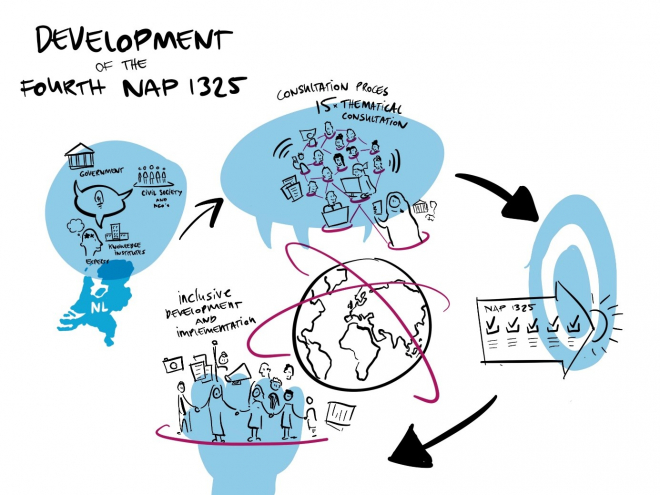Date: 16-12-2020Time: 3.30 PM 5.00 PM CETLocation: Online
INVITATION
Launch of the 4th National Action Plan Women, Peace and Security (2021-2025)
online December 16, 2020, 3.30 pm-5.00pm CET
The Dutch NAP 1325 Partnership cordially invites you to the online launch of the fourth National Action Plan on Women, Peace and Security (NAP 1325-IV).
For over 12 years the Ministries of Foreign Affairs, Defence, Education, Culture and Science, Justice and Security, the police and over 60 civil society organizations, among which are women's and diaspora organizations, development, humanitarian and peace building organizations, have been jointly developing the Dutch Women, Peace and Security Agenda. Together we are committed to a world in which equal and meaningful participation of women and girls in decision-making processes for peace and security is self-evident, sustainable peace and development opportunities are achievable for everyone and conflict-related violence against women, men, girls and boys is ended. Both in the Netherlands and abroad.
What will this new NAP 1325-IV in the coming years entail for the Dutch government and its civil society partners in the Netherlands and abroad? And what are our shared challenges and opportunities? This and more during the online launch event!
Please RSVP before 15th December 19.00 CET
_ _ _ _ _ _ _ _ _ _ _ _ _ _ _ _ _
PROGRAM
Table discussion part 1: International
Paul Huijts, Secretary-General, Ministry of Foreign Affairs
Marie-Laure Poiré, Global Advocacy Manager Global Partnership
for the Prevention of Armed Conflict
Rula Asad, Co-Founder Syrian Female Journalists Network
The priorities in the Women, Peace and Security Agenda are under worldwide pressure and are being dismissed as apolitical "women's issues" in some countries. What risks does this entail and how does this relate to developments around us when it comes to democracy and the distribution of power? How and where can we make a difference and what is needed for this?
Participation of women in all countries, in all institutions, and at all decision-making levels on peace and security is crucial: how do we ensure that women gain and maintain that role and how do we organize and support local ownership and involvement?
The Netherlands supports local women peace builders and human rights defenders. What does that mean in practice, what risks do these women face and what would it mean if they would not be able to continue their work?
Table discussion part 2: The Netherlands
A new element of the Dutch NAP 1325-IV is the focus on the domestic agenda. How does this NAP affect national policy? Who is going to notice? How can this agenda be implemented in a meaningful way?
As a result of conflict, women and girls have been traveling to the Netherlands for decades. Regardless of their residence status, they encounter Dutch government institutions: from the IND to the police and legal systems. How does the Netherlands protect these women and girls?
Support for women and girls from conflict situations requires empathy and specific knowledge. Are Dutch governments and agencies sufficiently equipped? What do women and girls face in practice? What are the lessons learned from both Dutch institutions and from organizations of women and girls themselves?
Moderator: Sahar Shirzad
